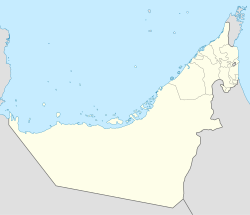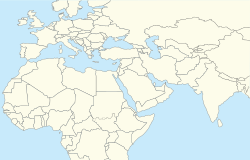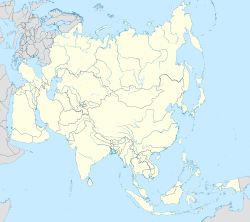This article has an unclear citation style. (January 2020) |
The Jumeirah Archaeological Site is a site which dates back to the Abbasid period in the 10th century CE, in the district of Jumeirah in the city of Dubai, the United Arab Emirates. It was first excavated in 1969 with different ancient items including architectural and decorative findings, ranging from a mosque, caravanserai, and residential houses to glazed pottery jars and plateware, bronze coins, glass and stone artefacts.[1][2][3] It is owned and managed by Dubai Culture & Arts Authority.
 Jumeirah Archaeological Site Office Building | |
| Location | Dubai, the U.A.E. |
|---|---|
| Coordinates | 25°11′48″N 55°14′30″E / 25.19679°N 55.24180°E |
| Area | Approximately 80,000 m2 (8.0 ha; 20 acres)[1] |
| Site notes | |
| Discovered | 1969[1] |
Overview
editArchaeological excavations at the site,[1][2][3] which was discovered in 1969, demonstrate that the area was inhabited as far back as the Abbasid era, approximately in the 10th century CE. Measuring about 80,000 m2 (860,000 sq ft), the site lays along a caravan route linking India and China to Oman and Iraq.[1][2][3]
Gallery
editSee also
editReferences
edit- ^ a b c d e Al Amir, Khitam; Cherian, Dona (2020-01-09). "Look: Sheikh Mohammed Bin Rashid visits Jumeirah Archaeological Site". Gulf News. Retrieved 2020-01-12.
- ^ a b c "Mohammed bin Rashid visits Jumeirah Archaeological Site". Emirates 24/7. 2020-01-09. Retrieved 2020-01-12.
- ^ a b c "'Happy and proud' Ruler of Dubai meets archaeologists at Jumeirah dig site". The National. 2020-01-09. Retrieved 2020-01-12.
External links
edit- Jumeirah Archaeological Site, Dubai Culture & Arts Authority
- Lonelyplanet website


